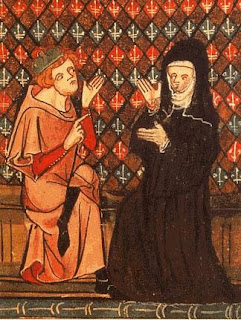A History of God: Questions for Chapters 10 and 11
READ: A History of God, Chapters 10,“The Death of God,”and 11“Does God Have a Future?”
“It is yearning that makes the heart deep.” St. Augustine.
We have read a book that describes humanity’s yearning for God, for ultimate knowledge, for understanding of the big picture. Now I ask you: Is it our task to yearn for God, or is it something else? Can the truth of the universe be grasped by human hands? Is human intelligence up to the revelation of the ultimate?
St. Augustine, for all his psychological quirks, saw obedience to God as the path to a freedom so complete it was unable to choose anything but the good. Many of our last set of thinkers see God as a prison warden, keeping us enslaved to ignorance and outmoded systems of morality.
Again, we return to our initial questions: What does God mean to you?
Consider, prayerfully, some of the ways you have experienced God. Is yours a God of power and might, a God of compassion, an intervenor in history, a wise counselor, creator of the stars of night, a father, a son, a spirit, an entity, a relationship, (I could list so many more.)
In Chapter 10, We arrive at the 19thcentury ramp up of science and industry, when the rational clock-maker ideas of the 18thcentury incarnate as locomotives, factories, and mind-blowing scientific advances. We meet Ludwig Feuerbach, Karl Marx, Charles Darwin, Friedrich Nietzsche and Sigmund Freud. In the theology of Schleiermacher, God descends into the heart and evokes “absolute dependence.” Rationalism and Romanticism become the latest dualism.
Most of the ideas described in this chapter will be familiar from high school and undergraduate classes. With which do you resonate? Which disturb you? Is God incompatible with the modern world, or have we gotten God wrong?
Can we believe in a loving God in the wake of Auschwitz? (p. 375)
Or consider the following from Zionism: “The Zionist no longer needs God; he himself is the creator.” (p. 374)
Chapter 11
What is logical positivism? (p. 379)
Think back on the optimism of the 1960’s. Armstrong doesn’t mention this, but Vatican II inspired many to leave the monasteries and seek God in the world, just as Protestants like William Hamilton asserted that all we needed was in the world. Now consider the following paradox: Death of God theologians celebrated the mature human for whom God was no longer necessary. But consider the following, from a psychology blog by Jeffrey Leiken, MA:
Research shows that the average American operates intellectually at the level of a sixth-grade education. Marketing and advertising is geared towards this level: Coke is it. Just do it. Simple enough for a sixth grader… Simple enough for your average American.
What is not so well researched, however what seems true to me, is that the average American also functions on an emotional maturity level which is far beneath their biological age, typically in the range of 8 to 20 years old developmentally.
Has our abundance of science, technology and information made us a more or less mature species?
Karl Barth is the architect of Protestant neo-orthodoxy. Do you, like Armstrong, find his theology unfortunate?
Some more names to ponder:
Paul Tillich
Process Theology
Martin Buber (I/Thou)
Abraham Joshua Heschel (a friend of Dr. Martin Luther King, Jr.)
What do you think of Armstrong’s conclusion? (p. 391ff)

Comments
Post a Comment